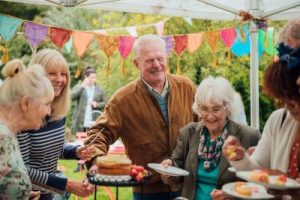It’s important to stay socially healthy at any age. However, since seniors are at a higher risk of social isolation compared to some other age groups, making and maintaining friendships when you are over 65 is vital. Not only do social connections make you feel good, but they also reduce your risk of developing certain conditions and illnesses.
What Are the Health Benefits of Being Socially Connected?
You may already know that spending time with friends can make you feel happy and lower your overall stress. You may also know that friends can help you build your self-confidence and self-worth. However, you may not realize that having strong social connections can benefit your brain health too.
When you are socially healthy, your mental and emotional health improves too. This is because spending time with friends is linked to the frequent release of stress-reducing hormones in the body. These hormones can boost your mood and prevent or reduce the effects of many mental illnesses. Additionally, those who suffer from trauma or loss can cope with the negative emotional effects of that trauma or loss by discussing it with others.
The Physical Health Benefits of Friendships
The stress-reducing hormones released from connecting with others can not only lower your stress levels but also boost your immune system. This makes it easier for your body to fight off infections and certain diseases, leading to better overall physical health.
Some studies have proven that people, including seniors, who have many supportive connections with others live longer and healthier lives. While we may not know all the direct benefits of socialization just yet, we do know that having these connections decreases our chances of developing health conditions and facing premature death.
How Loneliness Affects Seniors
Studies have also shown that a lack of social connections puts seniors at a higher risk of developing cognitive disorders, such as dementia and Alzheimer’s disease. In all age groups, a lack of socialization increases a person’s risk of developing high blood pressure, depression and obesity. In some cases, this lack of socialization also contributes to the onset of heart disease, stroke and cancer.
Loneliness typically manifests in people who do not feel that they have a strong support network. People who are lonely may or may not live alone, and they may or may not engage with others on a daily basis.
What Defines Strong Social Connections?
Most social connections can be categorized as intimate, relational or collective connections. Intimate connections are those made with our family and friends, while relational connections are those made with people we see regularly, such as coworkers or neighbors. Collective connections are those made with others whom we have affiliations with, such as those who share the same religion.
Any type of connection can become a strong connection when you feel comfortable with that connection or feel you can trust that person. Many times, people who share our interests become our closest connections. No matter how you form connections, remember that the quality of your connections matters much more than the number of connections you make.
How Seniors Can Make New Friends
Many adults struggle to find new friendships, seniors included. However, seniors can make new social connections any time when they engage with others in places like adult classes and interest-based group meetings.
Joining community groups is a great way to make new connections, especially if that group is centered around something you have an interest in. For example, board game nights or a variety of fitness group activities are sometimes held at local libraries and community centers for you to join if you enjoy those things.
Many senior living communities offer daily or weekly social events for their community members too. If you do not already live in one of these communities, consider joining one to meet like-minded neighbors. Park Place of Elmhurst is one senior community offering independent living and health services in Illinois, and we would love to see you come and enjoy all the social and recreational opportunities we offer for seniors.

